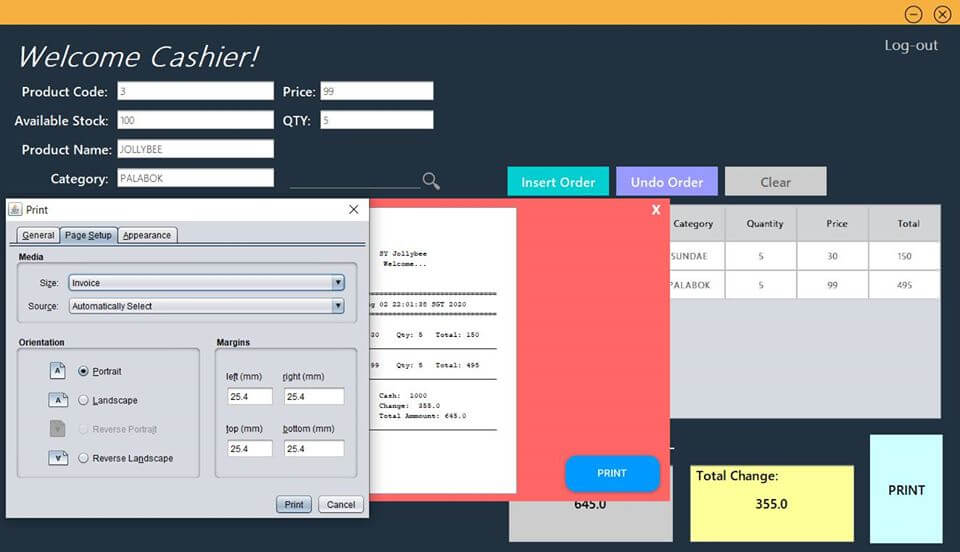Capstone Project Topics for Point of Sale
Are you looking for a unique and challenging capstone project in the field of information technology? Consider a point of sale (POS) system! POS systems are widely used in the retail industry for sales transactions, inventory management, and customer management. Developing a POS system as a capstone project can be a great opportunity to showcase your technical skills and problem-solving abilities. In this blog post, we will discuss some of the best capstone project topics for point of sale systems, as well as the benefits of choosing this type of project. Whether you are a student or a professional seeking to enhance your IT portfolio, a POS capstone project can be a valuable and rewarding experience.
Introduction to Point of Sale
Table of Contents
A Point of Sale (POS) system is a software and hardware solution used to manage sales transactions in various businesses, such as retail stores, restaurants, and hotels. It involves the use of a computer or mobile device to process transactions, manage inventory, and generate reports. With the rise of e-commerce and the increasing use of digital payments, businesses are now relying on POS systems more than ever to streamline their operations and improve customer experience. This has resulted in the need for more innovative and efficient POS solutions that can meet the changing needs of the market. One way to develop such systems is through capstone projects, which provide an opportunity for students to apply their skills and knowledge in real-world scenarios.

Benefits of Point of Sale
A point of sale (POS) application is an essential tool for any business that engages in transactions with customers. It is a computer-based system that enables businesses to manage sales, inventory, and customer information. The benefits of using a POS application are numerous, and they include:
- Increased Efficiency: A POS system can speed up the checkout process by automating tasks such as item scanning, price calculation, and change calculation. This allows sales transactions to be processed more quickly and accurately, thereby reducing customer wait times and increasing sales volume.
- Improved Inventory Management: A POS system can help businesses keep track of their inventory levels in real-time. It can also generate reports that provide insight into which products are selling well and which ones are not, enabling businesses to make informed decisions about their inventory management.
- Enhanced Customer Experience: A POS system can store customer information such as contact details, purchase history, and loyalty program data. This information can be used to personalize customer interactions and create a more engaging shopping experience.
- Better Data Management: A POS system can generate a wide range of reports that provide valuable insights into sales trends, inventory levels, and customer behavior. This data can be used to make informed decisions about pricing, promotions, and product selection.
- Increased Security: A POS system can help businesses protect their data by providing secure payment processing and encryption of sensitive information. This reduces the risk of fraud and data breaches, protecting both the business and its customers.
POS application is an essential tool for any business that wants to streamline its operations, improve customer experience, and gain valuable insights into its sales and inventory management.
List of Point of Sale Topics
This list of Point of Sale related topics is aimed at individuals who are interested in building or learning about Point of Sale applications. These topics cover a variety of technologies and programming languages, as well as concepts and frameworks, which can help developers and business owners in creating an effective and efficient Point of Sale system. Whether you are a beginner or an experienced developer, this list will provide you with some ideas and insights on how to design and develop a Point of Sale application that will suit your business needs.
- Point of Sale and Inventory System Conceptual Framework: This topic covers the framework used in designing a point of sale and inventory system. It discusses the different components and functions of the system and how they interact to provide a seamless transaction process.
- Point of Sale Application POS Use Case Diagram: This topic discusses the use case diagram for a point of sale application. It shows the various actors and use cases involved in the system, providing a visual representation of the system’s functionalities.
- Point of Sale and Inventory System using PHP: This topic discusses the development of a point of sale and inventory system using PHP programming language. It covers the different features of the system and how they were implemented using PHP.
- Java Swing Framework Point of Sale for Fast Food: This topic discusses the development of a point of sale system for fast food using Java Swing framework. It covers the design, development, and implementation of the system, including its features and functionalities.
- Point of Sale System for Pharmacy in C# and SQL Server: This topic discusses the development of a point of sale system for a pharmacy using C# programming language and SQL Server database. It covers the different features of the system, including sales, inventory, and customer management.
- Point of Sale System (POS) ER Diagram: This topic covers the entity-relationship diagram for a point of sale system. It shows the relationships between different entities in the system, including customers, products, and transactions.
- Point of Sale (POS) System in Python: This topic discusses the development of a point of sale system using Python programming language. It covers the different features of the system, including user authentication, sales management, and inventory management.
- Web Based Point of Sale in PHP and MySQL: This topic discusses the development of a web-based point of sale system using PHP and MySQL. It covers the different features of the system, including inventory management, customer management, and sales tracking.
- Point of Sale System Database Design: This topic covers the design of a database for a point of sale system. It discusses the different tables, relationships, and attributes that are needed for the system to function properly.
- Point of Sale with Decision Support System User Interface and Features: This topic discusses the integration of a decision support system with a point of sale system. It covers the user interface and features of the system, including data visualization and analysis tools.
- Point of Sale and Inventory System Capstone Project: This topic discusses the capstone project on the development of a point of sale and inventory system. It covers the different phases of the project, including planning, design, implementation, and testing.
- Point of Sale with Decision Support System: This topic discusses the integration of a decision support system with a point of sale system. It covers the different functionalities of the decision support system, including data analysis and forecasting.
- Point of Sale in Visual Basic: This topic discusses the development of a point of sale system using Visual Basic programming language. It covers the different features of the system, including sales management, inventory management, and reporting.
- Web-based POS System: This topic discusses the development of a web-based point of sale system. It covers the different features of the system, including customer management, inventory management, and sales tracking.
- POS with E-commerce Web Application: This topic discusses the integration of a point of sale system with an e-commerce web application. It covers the different functionalities of the system, including online ordering, payment processing, and inventory management.

Technologies Used in Developing a POS System
- Hardware components (such as barcode scanners, receipt printers, and cash registers)
- Software components (such as POS software, databases, and analytics tools)
- Integration with third-party software and services (such as accounting software and payment gateways)
A point of sale (POS) system is a crucial tool for businesses in managing their daily operations, from sales transactions to inventory management and beyond. The development of a POS system involves a variety of technologies that work together to create an efficient and effective system. The hardware components of a POS system include barcode scanners, receipt printers, and cash registers, among others. On the other hand, the software components include POS software, databases, and analytics tools. Integrating third-party software and services such as accounting software and payment gateways can also enhance the functionality of a POS system. In this article, we will discuss the technologies used in developing a POS system and their respective benefits to businesses.
Key Features to Include in a POS System
A point of sale (POS) system is a critical component of any retail or hospitality business. It is the central hub for processing sales, managing inventory, and providing customer service. Here are some key features that every POS system should have:
- Sales Processing: A POS system should provide a user-friendly interface for processing sales. This includes scanning items, adding discounts, and accepting various payment methods.
- Inventory Management: A POS system should track inventory levels and provide alerts when stock is running low. It should also allow for easy management of items such as creating new products, updating prices, and managing product categories.
- Customer Management: A POS system should allow for the creation and management of customer profiles, which can include purchase history, contact information, and loyalty program details.
- Reporting and Analytics: A POS system should provide access to sales and inventory reports that can help business owners make informed decisions about their operations.
- Integration with Third-party Services: A POS system should be able to integrate with other software and services such as accounting software, payment gateways, and e-commerce platforms.
- Security: A POS system should be secure and protect sensitive customer data. This includes features such as user authentication, data encryption, and secure payment processing.
- Scalability: A POS system should be able to scale with a business as it grows. This includes the ability to add new hardware components, manage multiple store locations, and handle increased transaction volume.
Conclusion
In conclusion, a point of sale system is an essential tool for businesses to streamline their operations, improve their customer service, and increase their profits. To create an effective POS system, developers must consider the hardware and software components, integration with third-party software and services, and the key features such as inventory management, sales tracking, and reporting.
For those who are interested in pursuing a capstone project related to POS system development, there are various topics to choose from such as web-based POS systems, Java Swing framework POS, and POS with e-commerce web applications. This field presents a great opportunity to learn new skills and contribute to the advancement of the industry.
If you are interested in learning more about POS system development and implementation, there are many resources available online such as tutorials, courses, and forums. Don’t hesitate to take the first step towards creating your own POS system and taking your business to the next level.
Readers are also interested in:
- 27 Inventory System Capstone Project Ideas
- List of 55 Best IT Capstone Projects on Business Administration and Management
You may visit our Facebook page for more information, inquiries, and comments. Please subscribe also to our YouTube Channel to receive free capstone projects resources and computer programming tutorials.
Hire our team to do the project


